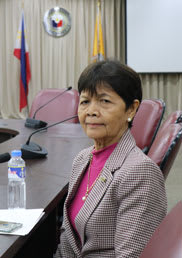Lanao del Sur launches early response network (ERN) to stem violence
The province of Lanao del Sur launched a new and more powerful early response network (ERN) that involves local disaster risk reduction and management officers (LDRRMO) from 39 municipalities. This ERN will be used to share information using advanced technologies and enable teamwork in the prevention of future violent conflict, disaster and displacement.

The provincial Disaster Risk Reduction and Management Office of Lanao del Sur and the Lanao del Sur-wide rescue group SARACAN were both supported by International Alert Philippines in the establishment of this network. It will secure real-time information that is needed to prevent, counter and adapt to emergencies while also coordinating with civil society organisations, traditional leaders, other stakeholders, and the relevant political authorities at the local, provincial, and national level. The system monitors tensions and critical events in order to prevent them from erupting into violent flashpoints.
The Marawi siege has taught us that we should strengthen ourselves and evolve into more responsive disaster and conflict risk reduction management officers. We also need to create the rules and protocols for human-induced disasters, not just natural calamities.
Saripada “Tong” Pacasum, Jr., LDRRMO-IV of the Provincial Disaster Risk Reduction Management Office of Lanao del Sur.
In 2017, the ISIS-linked Maute terror group overtook the provincial capital and launched a five-month siege which decimated the city centre, killed more than a thousand people and displaced approximately 300,000 others. Pacasum led members of his staff and SARACAN volunteers to aid military rescue and recovery operations, saving some 1,700 lives.
“Looking back, I know that we could have helped avert the war, saved more lives, and prevented the suffering of our people if we already had a system to pool and piece together relevant information on the ground,” Pacasum said.
“With the ERN, we are committed to help avert violence by harnessing this wealth of actionable information and to come up with immediate and appropriate responses to violent conflict, as well as long-term initiatives that promote peace in communities,” he added.
The ERN will use International Alert’s existing Critical Events Monitoring System (CEMS), an SMS-based reporting system that reports violent conflict and tension as it arises in communities in the Philippines. Subsequently, CEMS coordinates a prompt multi-stakeholder response to emergencies and potential flashpoints on a case by case basis.
Local response to conflict

“It is the local people who are closest and most vulnerable to conflict, and they are also the ones who have the knowledge, capability, and agency to resolve issues that challenge them at the local level,” Nikki de la Rosa, International Alert Country Manager said.
De la Rosa emphasized the fact that the ERN mechanism goes beyond recommending a security-centric approach to violent conflict. Instead, it “puts premium and harnesses traditional, formal, and hybrid institutions and arrangements” to prevent conflict.
“Since 2010, International Alert has been establishing ERNs across Muslim Mindanao composed of multiple stakeholders in building conflict-resilient communities. We involve traditional, religious, and clan leaders, alongside local governments, who all have a key role in resolving clan feuds and resource conflicts in Muslim Mindanao. We involve women and the youth who lead community change projects that promote their participation in economic activities and governance. We also involve the business sector in our advocacy of fighting discrimination in the workplace based on religious and cultural beliefs and in espousing conflict-sensitive practices in areas where they operate,” de la Rosa shared.
The ERN recognises, facilitates and strengthens these locally-rooted mechanisms that have proven to be effective in alleviating people’s vulnerabilities and prepares them for emerging threats such as violent extremism.
Nikki de la Rosa, International Alert Philippines Country Manager
De la Rosa also said that having an ERN in Lanao del Sur is an important step in consolidating efforts to support the peace process in Marawi’s critical rehabilitation period and its transition to the Bangsamoro Autonomous Region in Muslim Mindanao.
During the launch, members of the ERN all signed a document that serves as a testament to their commitment to sharing information and “championing inclusive, innovative, and conflict sensitive ways of responding to the needs of communities, cities and municipalities, and the entire province in times of crisis.”




